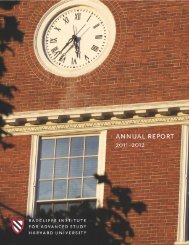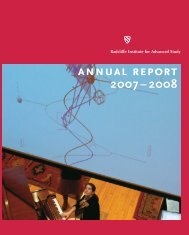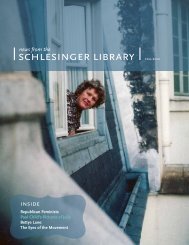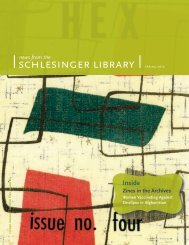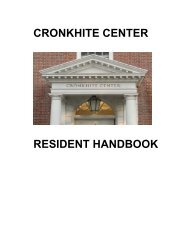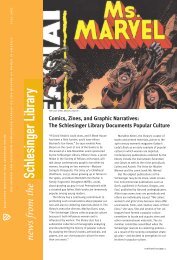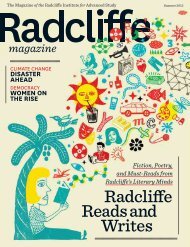Download PDF Version - Radcliffe Institute for Advanced Study
Download PDF Version - Radcliffe Institute for Advanced Study
Download PDF Version - Radcliffe Institute for Advanced Study
You also want an ePaper? Increase the reach of your titles
YUMPU automatically turns print PDFs into web optimized ePapers that Google loves.
June 2006<br />
9<br />
<strong>Radcliffe</strong> Day<br />
Linda Greenhouse ’68, the New York Times Supreme Court<br />
correspondent and Pulitzer Prize winner, <strong>Radcliffe</strong><br />
Medalist<br />
<strong>Radcliffe</strong> Day 2006<br />
The day after Harvard’s Commencement is always <strong>Radcliffe</strong> Day, the<br />
culmination of reunion week <strong>for</strong> <strong>Radcliffe</strong> College alumnae. It’s also<br />
a day when the <strong>Radcliffe</strong> <strong>Institute</strong>’s roots in <strong>Radcliffe</strong> College are<br />
especially evident and celebrated. This year <strong>for</strong> the first time, a <strong>Radcliffe</strong><br />
College alumna was selected to receive the <strong>Radcliffe</strong> <strong>Institute</strong><br />
Medal. Approximately eight hundred people attended the annual<br />
luncheon where Linda Greenhouse ’68 received her medal and delivered<br />
a poignant speech. Earlier in the day, the <strong>Radcliffe</strong> Alumnae<br />
Awards Symposium in Agassiz House was attended by 375 people.<br />
Holding with tradition, alumnae started the day by gathering to<br />
honor classmates and friends at the annual commemorative service.<br />
Linda Greenhouse ’68 Receives <strong>Radcliffe</strong> <strong>Institute</strong> Medal<br />
Greenhouse, the renowned commentator on the United States<br />
Supreme Court who writes <strong>for</strong> the New York Times, described the<br />
shortcomings and achievements of her baby boom generation. Several<br />
years ago, when she and her husband went to a Simon and Garfunkel<br />
concert in Washington, DC, she burst into tears after hearing<br />
the line “They’ve all come in search of America.” She couldn’t stop<br />
crying, an unusual reaction <strong>for</strong> her, but a few days later, she realized<br />
why. She had always believed that her generation would do a better<br />
job than its predecessors and now she realized it hadn’t. “We had<br />
not learned from the old mistakes,” she said. “Our generation had<br />
not proved to be the solution. We were the problem.”<br />
At the same time, however, Greenhouse acknowledged the impressive<br />
gains that women of her generation have made in the workplace.<br />
She listed several <strong>Radcliffe</strong> alumnae who hold high-level positions at<br />
the New York Times: Jill Abramson ’76 is the managing editor; Susan<br />
Chira ’80 is the <strong>for</strong>eign editor; and Alison Mitchell ’76 is the editor in<br />
charge of news about education. “No young woman has to feel that<br />
any door in journalism is closed to her,” Greenhouse said.<br />
Women, Power, and Change: How Far Have We Come<br />
At the morning symposium, each award recipient reflected on this<br />
question. Pulitzer Prize–winning journalist Susan Faludi ’81, who<br />
received an Alumnae Recognition Award, said consumer culture<br />
has “manipulated feminist rhetoric to sell women everything from<br />
credit cards to cosmetic surgery to antidepressants. In the process,<br />
it sold women on a great complacency.”<br />
Amy Gutmann ’71, PhD ’76, president of the University of Pennsylvania<br />
and another recipient of an Alumnae Recognition Award,<br />
said, “If we have learned anything from the great civil rights movement,<br />
it is that there is no substitute <strong>for</strong> joining together and tackling<br />
injustice head-on.”<br />
Jane Roland Martin ’51, EdM ’56, PhD ’61, BI ’81, a professor emerita<br />
of philosophy at the University of Massachusetts at Boston, who<br />
also received an Alumnae Recognition Award, described how education<br />
has changed women and women have changed education.<br />
Judith Lewis Herman ’64, MD ’68, BI ’85, RI ’02, a pioneer in the<br />
study of sexual abuse of women and children, said she tried to curb<br />
her protestations whenever she heard a woman being disparaged<br />
at work. “Even so,” she said, “I was mouthing off all the time.”<br />
Herman received a Graduate Society Award.<br />
The other recipient of the Graduate Society Award, Elaine Pagels<br />
PhD ’70, the Harrington Spear Paine Professor of Religion at<br />
Princeton University, was unable to attend the symposium.<br />
The Jane Rainie Opel ’50 Young Alumna Award was presented in<br />
absentia to Jehane Noujaim ’96, an award-winning filmmaker.<br />
Distinguished Service Awards were presented to the following six<br />
alumnae: Joan Harvey Burns ’56, Ann Farist Butler ’51, Paula Budlong<br />
Cronin ’56, Ann Myers Hershfang ’56, Katharine F. Mack ’46,<br />
and Sheila Brown Rice ’51.<br />
Alice Randall ’81 Speaks at Commemorative Service<br />
<strong>Radcliffe</strong> Day began with an early morning service in The Memorial<br />
Church, at which the <strong>Radcliffe</strong> Reunion Choir sang and representatives<br />
of reunion classes spoke. Cassandra Chrones Moore ’56 delivered<br />
the welcome, and Alice Randall ’81, a novelist, gave the address.<br />
For full coverage of <strong>Radcliffe</strong> Day, visit www.radcliffe.edu/alumnae/events.<br />
30<br />
www.radcliffe.edu



